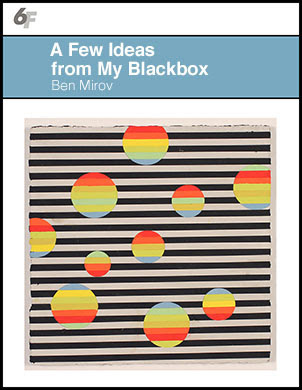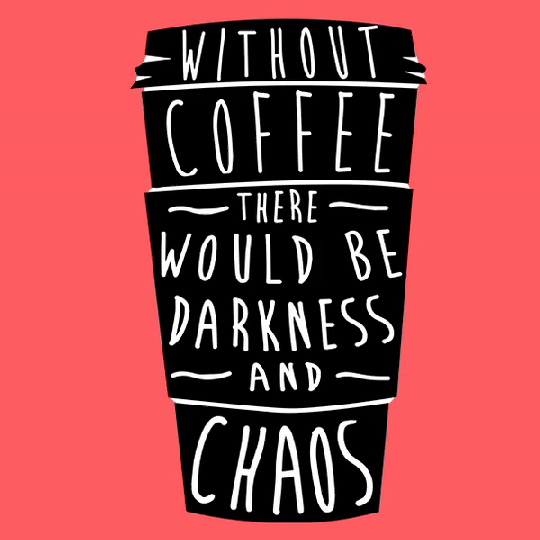
A Few Ideas from My Blackbox, by Ben Mirov. Sixth Finch Books, 2016. 34 pages. $10.00, paper.
Question: if you’re in a life-or-death situation, what would be the thoughts—no, ideas—going around in your head?
Or, as Ben Mirov asks in his latest chapbook, A Few Ideas from My Blackbox, “Can you imagine a whippoorwill?”
Mirov’s chapbook presents poetically ideological and existential questions in literal and figurative spaces. Each poem is short (one page or less). The use of short, simple couplet stanzas prevents the reader from being visually overwhelmed from what is on the page—his ideas. Each page has visual space, for this is a collection that, on the surface, does not want to inundate the reader with an abundance of text. Yet, this is where Mirov excels as a modern Poet. He knows that Poetry does not have to be “wordy” to be thought-provoking or even humorous. In fact, Mirov often makes these poems be simultaneously thought-provoking and humorous. In the first couplet of the first poem, “# 23.33”:
Can you imagine a whippoorwill? I can’t.
I’ve never seen one before.
To begin a collection of poems as Mirov does is, on the surface, witty Poetic comedy that seems at first arbitrary (more on the arbitrary qualities later), but my above-mentioned simplicity of visual space lends the reader a willingness to re-read each poem immediately after finishing it. So, one can instantly look at the above stanza and re-evaluate what it’s insinuating: Irony. If one is to see a whippoorwill, it wouldn’t have to be imagined in the first place. More so, underneath the humor of arbitrariness, lies the question Do we live in a modern society where we cannot imagine anymore? … do we need to see? Mirov’s “ideas” tell us it is still possible to imagine in Poetry and Poetics.
While each little stanza lends to part of the surface simplicity of these poems, Mirov makes Poetic connections between each stanza that, when the poem is read wholly, leaves the reader with a meaningful Poetic experience. The Poetic whole is the sum of all its parts, in other words. As in the next stanza:
Life is full of dismal situations.
None of them meant for us.
While this stanza, read on its own, may not seem very thought-provoking (even a bit cliché), its job is to connect the reader from the arbitrary whippoorwill in first line into the rest of the poem. The poem ultimately forces the reader (playfully) to ponder Life existentially:
Nothing exists.
Just the moments
lined up like little dots.
Super-intelligent dots.
Little dots. Blackbox is filled with these little dots that are in turn filled with big ideas. Mirov is a Poet who, while concerned with just making it through another day (like many of us), is also constantly observing, thinking, interpreting the world around him. In Blackbox, he equates Life to the “little dots” of moments, situations, and experiences of silly-ness. Life is “a seemingly unending series of illusions” (“# 16”) that we may think about when the shit hits the fan in Life. What’s it all mean? Mirov even states in “#2021,” “I am the Buddha.” Mirov interprets the life of a working man, dealing with “the handiwork of fuckups” in “# 333” and dealing with lack of funds at the ATM. But he’s also aware of the working man’s frustrations with government, issues of “public concern,” of making a living verses having dreams. He’s aware of the technological age we live in, which leads to the question Are the dots of our Lives becoming more connected by technology or just the opposite?
But Mirov doesn’t just observe all this, he interprets. He’s a genuine man in our World, but in Blackbox, he invites us into his World. This is what a Poet does. There are clever moments, such as in “# 453,” where in Life we must be nice to the Idiot … but in Mirov’s World, such nice acts could be included on “applications for the Bureaucratic Motherbrain Relief Fund.” In the following poem, “# 76,” Mirov’s witty and dry Poetic humor comes out by using a tactic of dichotomy between his World and the simple Lives we live:
Located somewhere within the circuitry
of the warm soft thought machine […]
[…] I have settled upon a small bowl of noodles […]
Whereas the first half of this poem describes, through a grammatically complex structure nonetheless, his “thought machine.” Then, instantly, he’s talking about his “bowl of noodles” for lunch. This is a technique that is used in various places within Blackbox and Mirov is an expert at knowing when, where and how to make these transitions between what’s in his fucked up head and what we all can relate to … to lunching on noodles. He does this also in “# IIIXVI”:
Have you ever lifted
The edge of the idea curtain […]
[…] Some days I can’t even leave the kitchen […]
Where his big ideas of an “idea curtain” ultimately are stymied by just trying to survive another day like most of us.
We’re surviving another day in a Life of arbitrary dots of moments that connect to proceeding moments and so on. Ultimately this is what Blackbox tells (or reminds) the reader. The reader cannot help but notice each poem in this little collection is titled with a number. But what Mirov does is omit any linear numerical ordering of the poems. More so, the numbers aren’t always whole … or positive … or even Arabic numerals: “# 23.33” or “# -52” or “# IIIXVI.” Yet further, even though there are twenty-seven poems in this collection, the titles go up to “# 94,000,000.” This suggests to the reader that despite the cliché we may say about life-or-death moments (“millions of thoughts went racing through my head” per se), these poems are just a few ideas from Ben Mirov’s blackbox. It’s suggested that Mirov has had literally millions of these life-or-death ideas. And if we survive, “[o]ne can only guess / the outcomes of living” (“# 32”).
Blackbox is a collection that suggests and insinuates, through arbitrary moments, the bigger questions of Life. Short and sweet, Blackbox makes me wonder what other ideas are in Mirov’s head.
Buy A Few Ideas from My Blackbox at Sixth Finch Books
David Welper was recently nominated for a Pushcart Prize by sPARKLE & bLINK. He received his MA from Wayne State University in Detroit. Work appears in Denver Poetry Map, Red Light Lit, Riverbabble, Oakland Review and other publications. He’s been a featured reader in NYC, Detroit, and the Bay. Last year he finished a new manuscript called Sorry Sir, We’re Gonna Have To Ask You To Leave. He is an Assistant Poetry Editor at Rivet and writes book reviews on Entropy and Heavy Feather Review. He just started a line of his urban art T-shirts at dDoubleUurbanartWear.com. He is a psychiatric nurse living in the Bay Area. More: DavidWelper.com.
What’s HFR up to? Read our current issue, submit, or write for Heavy Feather.
Advertisements Share this:




